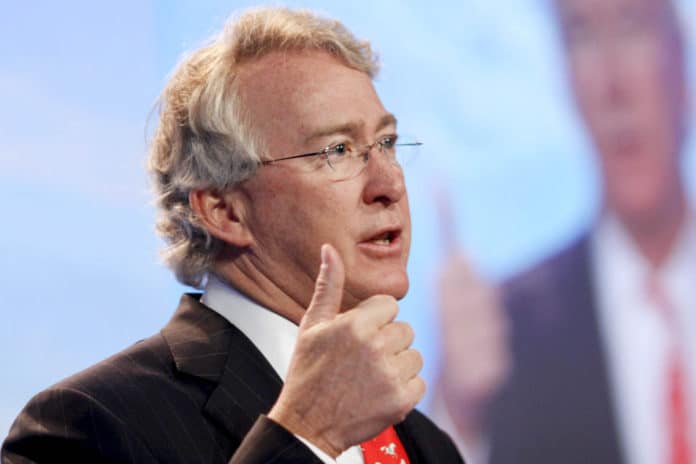Investigations into the death of Aubrey McClendon are now closed, with police having found no evidence of suicide and the state medical examiner ruling his death an accident when his car struck a wall March 2.
The Chesapeake Energy Corp. co-founder’s 2013 Chevy Tahoe crashed the morning after a federal grand jury indicted him on bid-rigging charges. The police investigation, which included a review of emails and mobile phone records, concluded McClendon’s death was not a homicide, Capt. Paco Balderrama said Wednesday in a phone interview. The state medical examiner separately released autopsy results ruling his death an accident, with toxicology results negative for alcohol.
“We can’t rule out suicide,” Balderrama said. “We found no evidence that points to suicide but we can’t be 100 percent certain. There’s no note, there’s no email, there’s no conversation that said that he was going to do this.”
A report on the crash in March showed that McClendon, made no serious attempt to slow his SUV as it veered across the road and smashed into a concrete wall at 78 miles per hour, bursting into flames and killing him. The SUV crossed the road’s center line 189 feet before hitting the wall, maintaining a speed of 88 miles per hour even as he lightly tapped the brakes several times. It slowed upon impact, possibly because it hit softer ground after leaving the roadway, the police said.
Another person died at the same place two weeks ago, Balderrama said.
Police are unable to rule out a medical cause, such as a seizure or stroke, or whether McClendon was distracted by texting as he approached the narrow underpass about 20 minutes northeast of his Oklahoma City office, Balderrama said.
“He was pretty proud of how much business he could conduct while he was driving,” Balderrama said. “Is it possible he was glancing down, went over, managed to hold the car together but wasn’t able to correct himself? All these things are possibilities. All we can say is that he wasn’t murdered.”
The latest police report won’t be released, he said. The state’s autopsy report officially ends the investigation into McClendon’s death, Amy Elliott, a spokeswoman with the medical examiner, said in an interview.
When McClendon was terminated by Chesapeake in 2013, he was covered by a company-sponsored life insurance policy with maximum coverage of $2.5 million. Under the termination agreement, the policy was extended through June 2014, at which time McClendon had the option of taking over premium payments personally, company filings showed.
Doxylamine, an over-the-counter antihistamine, was detected in McClendon’s blood but not confirmed in his liver, according to the autopsy report signed by Marc Harrison, a pathologist with the state medical examiner. A test for carbon monoxide was negative. The medical examiner in March said McClendon died from wounds caused by multiple blunt force trauma.
“This 56-year-old white male was found unresponsive within a severely crushed and burned motor vehicle after it apparently impacted a bridge,” according to the report. “There were extensive thermal burns noted to the decedent.”






